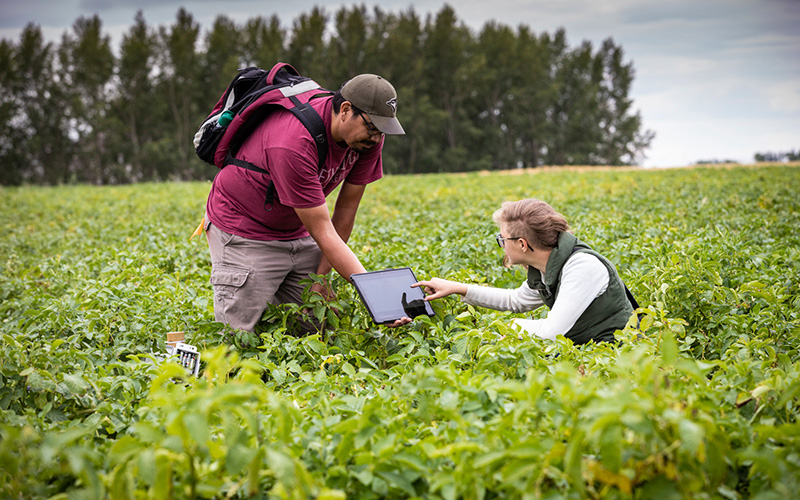Student spotlight:
Jason Cotton puts theory into practice as a research assistant in the Mueller Irrigation program
Jason Cotton, a third-year Ecosystem Management student at Lethbridge College, got to put the lessons he learned in the classroom into action last summer. Cotton, who completed the first two years of his program and earned a Renewable Resource Management diploma in 2019, joined a team from the Centre for Applied Research, Innovation and Entrepreneurship (CARIE) taking part in a four-year research project study of Alberta potato crops.

“The skills I learned in class from the Renewable Resource Management program gave me the tools I needed to provide the research project an effective member of the field technician team,” he says. “I have never done field work as a job until now. However, the training I received in my diploma program gave me the tools I needed to succeed in the face of challenges I might encounter.”
The project, a partnership between CARIE and the Potato Growers of Alberta made possible through a grant from the Canadian Agricultural Partnership, is looking at how watering and irrigation methods affect southern Alberta’s potato crops. The research team is monitoring five different southern Alberta potato farms to see how moisture reacts with and affects crops and recording how producers use their existing irrigation and available water sources and the outcome it has on crops in different parts of their fields.
Cotton joined the team in August 2019 as field research assistant working under Dr. Willemijn Appels, Lethbridge College’s Mueller Applied Research Chair in Irrigation Science. As part of the team, Cotton was involved in taking soil samples, collecting soil moisture and weather data and surveying soil moisture variability. He was also trained as a UAV pilot and assisted with aerial field mapping. And the work didn’t stop there – he also spent hours in the lab testing soil samples and determining yields.
“I was surprised how much fun I had working with a great leader and a wonderful group of coworkers,” he says. “In addition, I thought getting my remotely piloted automated systems certificate was especially fun to attain.”
Cotton was one of more than 1,000 students who took part in applied research at Lethbridge College in 2018-19 – a number that has quadrupled since 2013-14. In addition, he was one of 196 students involved in agriculture-related research projects.
“It was great to have Jason on our team and see him apply concepts taught in school to the observations we took in the real world,” said Dr. Appels. “Working with students who are new to fieldwork as a job is interesting because they tend to observe and question things that experienced fieldworkers take for granted.”
Cotton was also one of two Indigenous students to take part in the SevenGen 2019 Indigenous Student Energy Summit held at Mount Royal University in Calgary in January 2019. Cotton, along with Justin Bruised Head (Ecosystem Management Degree), represented the Kainai First Nation. The summit brought together 200 Indigenous and non-Indigenous youth from across Canada together to discuss Indigenous-led energy solutions and provide mentorship, academic, and career development opportunities.
“Lethbridge College is a good place to work and learn,” says Cotton. “Working with potatoes all summer has only created a hunger for more knowledge.”